- Home
- Jeff Mariotte
Blood Quantum Page 3
Blood Quantum Read online
Page 3
"I'm sure."
Marvin Coatsworth stepped up behind Sam Vega and tapped him on the arm. "Detective Vega, are we quite through for tonight? I'd like to allow Mr. McCann to retire. He's been through an emotional occurrence."
"Not just yet, Mr. Coatsworth, but soon, all right? My crime-scene people will be here for a while, and the coroner's assistant has just arrived, so it'll still be a while before the John Doe is removed from the driveway. But I'll be able to cut these people loose soon enough, I think."
"Sooner rather than later, please." Coatsworth spun around and returned to McCann's side. If there was any love between Coatsworth and Stilton, Catherine hadn't noticed it. The air had been almost glacial when the two men were in close proximity to each other.
Sam pulled Catherine aside. "The very rich," he said. "Just like you and me, except that they're not, right?"
"I don't think I'd want to be like them, but if they wanted to pay some of my bills, that would be okay."
"Did you sense anything from any of them?"
"Other than the fact that the people working for Mrs. Cameron don't like each other very much? Nothing that seems to have any bearing on the case, at least at first glance."
"There are two eyewitnesses, as well: Lyle Armstrong, a security officer who was monitoring the whole thing from the security command room inside the main house, and Kathleen Slides, a housekeeper who was watching on a video monitor inside McCann's suite."
"Two witnesses, one step removed, and there's also surveillance video?"
"That's right."
"Why haven't we all gone home?"
"Hey, I agree with you – I think this is just what it appears to be. But the intruder didn't have a gun. Daria Cameron is missing, and there hasn't been a ransom demand or really any clue whatsoever where she's gone. Dustin Gottlieb seems like a perfectly nice guy, but apparently, he was fired a couple of months ago, then rehired three weeks ago. Some of the other members of the household staff seem a little resentful of that. This place is more than a little on edge, and I want to cover all our bases as to what went down before we call it a justified kill and let McCann walk."
"Well, we need to find out who the dead man is first. Find out where he got a piece of paper with the address and the front gate's combination code on it.
"When we know those answers, I'm sure the rest will fall into place."
"We're already on it, Sam. I don't know about falling into place. In my experience, crimes seldom do that when you want them to. But maybe this one's the exception. Let's hope."
"Oh, I'm hoping," Sam said. "Believe me, I'm hoping like crazy."
3
QUANTUM.
The word was written on a smooth white wall in foot-high red letters. The medium of choice appeared to match the substance spread around the living room, most of it close to the dead body that was the reason Ray Langston and Nick Stokes had joined police captain Jim Brass in the house. If the word hadn't been scrawled in blood, it was a good imitation.
"Quantum?" Nick said, apparently noting that Ray's attention was drawn to the wall. There were several reasons for that. Ray had been a doctor once, specializing in forensic pathology, and since then, he had been a university professor. At Gil Grissom's invitation – shortly before Grissom left the crime lab – Ray had become a Level One CSI. He had found that there was a significant difference between examining the victim of violent crime in the controlled environment of a hospital or a university lab and seeing it in its native habitat – on the streets, in nature, or, as in this case, on the floor of a relatively clean and high-end Las Vegas home. Ray didn't object to studying a body as closely as was necessary to do the job, but he still liked to ease up to it. Looking at the overall scene first helped him do that.
Second, it wasn't every day that he saw a word written in blood. The way he'd heard it, in what seemed like a dozen bad crime stories, it was the victim himself who wrote his killer's name in blood. But this victim was sprawled on the floor, and the word was five feet up on the wall. It didn't seem likely that the dead man had managed to stand up – especially once enough blood had flowed to give him something to write with – and if he had, why write that word? Was the killer named Quantum? Ray had encountered some strange names, but he'd never heard of anyone with that one.
So it was the word on the wall, rather than the body on the floor, that started his mind spinning first. The body was the important thing, and he knew he would have to turn his attention to it momentarily. The deceased was the reason they were there. A human being's life had been snuffed out, most likely at the hands of another, and they would have to search for the who, the why, the wherefore, to make sure the guilty were punished and the victims avenged to the extent the law demanded. In the most recent part of Ray's career arc, questions of life and death, crime and punishment, had been academic ones. No longer. Now they were specific and real, and the consequences were huge.
For the moment, though, he was most curious about who had written QUANTUM on the wall and even more curious about why. "Quantum," he repeated, aware that an uncomfortable length of time had passed since Nick had said it.
"Anybody have a guess what that's all about?" Nick asked.
"Not a clue," Jim Brass said. His voice was a low growl, like a bear just awakening from hibernation. "I was hoping maybe it was something you learned in CSI school."
Ray had to glance at the cop to ascertain that he was joking. Brass's sense of humor was as dry as a Nevada autumn, and Ray hadn't known him long enough always to be certain when it was being employed. Brass looked like a serious guy, sturdy enough to stand up to a hurricane, with a short, no-nonsense haircut and a face that could go from solemn to unexpectedly sunny in the space of a heartbeat.
"If it was, I was absent that day," Ray said.
"And I must have skipped school," Nick added.
Brass folded his arms over his chest and glared at the wall, as if warning it to give up its secrets or face his wrath. "Well, if you come up with anything, let me know, because I'm stumped."
"What do we know about the vic?" Nick asked, returning everybody's attention to the most important topic of the moment.
"His name's Robert Domingo," Brass said. "He owns this house. He also owns another one on the Grey Rock Paiute Reservation, where he's the tribal chairman."
"He's the chairman, and yet he lives off the reservation?" Ray asked. "Is that normal?"
"I don't know," Brass said. "I only know it's the case here, because when I found out who he was, I ran a background check. He's an important man in the Grey Rock tribe."
Nick nodded his head. He was wearing a dark blue ball cap with "Forensics" printed on the front in yellow letters. "No kidding… that's like being the president, right? Top of the heap."
Ray sniffed the air, trying to isolate the smells. Blood, death, and cigar. Cigar odor permeated the room – the draperies, the black rug covering part of the expensive tile floor, maybe even the paint on the walls. There had been one smoked recently – a butt rested in an ashtray on an end table – but Ray got the feeling Domingo was a man who liked a cigar or two a day, every day.
Finally, Ray let his gaze drift back to the body and linger there. Robert Domingo was facedown on the slate-gray tiles. He was wearing a black silk shirt, black pants, a sleek black leather belt, and black socks. A pair of black leather wingtips was parked beside the door, as if Domingo habitually removed them there when he came in. There was blood all around the body, and in the middle of that blood was a gold cigarette lighter with a chunky base, the kind that sits on a table instead of going into a pocket or a purse. The gold was flecked with blood.
The back of Domingo's skull was caved in, probably not coincidentally by an object the approximate size and shape of the gold lighter.
"Cause of death looks pretty straightforward," Nick said, crouching for a closer look at the wound.
Ray agreed. "That lighter."
"That's my guess."
"I gave you
the victim's identity," Brass said. "And you're probably right, I think we'll find that the COD is blunt-force trauma caused by a blow to the head by that cigarette lighter. Didn't help him, anyway, that's for sure. But I know how you crime-lab types love a mystery… so I guess that's what the 'Quantum' is there for."
Ray adjusted his glasses and looked at the captain. "What, figuring out who hit Mr. Domingo with the lighter isn't mystery enough?"
"Just trying to make sure you're intellectually challenged, Professor."
"I appreciate the consideration, but don't put yourself out on my account."
Nick straightened up again. He was handsome, square-jawed, broad-shouldered. Looking at him now, Ray could still detect traces of the Texas high-school football star he had once been. "You know what?" Nick asked. "And before you say that I'm stereotyping, you're right, I am. But it just occurs to me that this is the home of a Native American tribal chairman, and you'd never know it from the dйcor."
He was right. The furniture was sleek and modern, the art on the walls contemporary and most of it as meaningless to Ray as motel art. A flat-screen TV almost as wide as a barn door dominated the room. The whole place could have been an upscale hotel or a model house, for that matter, for as much of Domingo's personality as it revealed. There didn't even seem to be a family photograph around that Ray could see.
Or maybe it did reveal something after all. Ray just wasn't sure precisely what that might be. That Robert Domingo was a colorless man, who lived a sterile existence? Maybe. Or that he was hiding out here, seeking an escape from the untamed hues of real life? At any rate, Domingo seemed fond of black and white; even the abstract paintings he had chosen were mostly black, white, and shades of gray. They looked to Ray as if an artist had dripped paint chosen from a very limited palette onto canvases and then left them out in the rain, but he wasn't there to pass judgment on the deceased's taste in art or his other decorative choices.
The stereotype would have been native blankets and baskets and pots scattered around, maybe a spear or a bow on a wall. Maybe even kachinas and carved coyotes, to take it to the absurd extreme. Ray wasn't surprised that some Native Americans would choose to pass over those traditional trappings, to adopt a different style. But he wondered how the people living on the Grey Rock Reservation felt about their chairman having a luxurious home off-reservation, a home that showed no traces of the chairman's heritage. If they even knew about it.
"What do you know about the Grey Rock Paiutes, Jim?" he asked.
"Not a hell of a lot," Brass admitted. "Their reservation is one of the closest to Las Vegas – I believe some of its holdings actually fall within city-limit lines, although, of course, those limits are carved out by the tribe's sovereign territory. Lots of poverty on the reservation, which is unfortunately not unique to this tribe. For decades, they had a gas-station and smoke shop on the interstate outside of town. In the past ten or fifteen years, though, they've expanded their commercial ventures to include a casino, a hotel and spa, a golf course, and I think more that I can't remember just now. So they're bringing in some cash, but apparently, it hasn't flowed out to all the members yet."
"How long has Mr. Domingo been chairman?"
"Quite a while, I think, but I'd have to check."
"I'm just curious."
"Of course."
They stood looking at Domingo's body for another minute, Ray wondering how angry someone would have to be to do so much damage with a cigarette lighter. That's a pretty up-close and personal way to do someone in, he thought. And a weapon of convenience, not one that someone who had come here planning murder would have used.
"Ready to get to it?" Nick asked.
"Of course, Nick. Let's go."
"I'll leave you two to do your thing," Brass said, starting toward the front door. "There'll be a uniform outside, and the coroner's people should be here soon. Let me know if you turn up anything interesting."
"You got it," Nick said. "Ray, you want to take the inside while I take out?"
"That works for me," Ray agreed. "Let me get my kit."
*
Nick walked slowly around the house, training his flashlight on the ground near the doors and windows and then on the doors and windows themselves. He was searching for tool marks, footprints, or anything that might have been dropped near the house, checking each to see if someone had entered through anything except the front door. That door had been left standing wide open, lights blazing inside, which had attracted the attention of a neighbor taking his incontinent briard on a two a.m. stroll. The neighbor had never known Domingo to leave his door open like that, and having been the victim himself of a still-unsolved break-in six months before, he had rushed home and called 911 immediately. Responding officers had knocked, entered, and found Domingo dead in his living room.
The first thing Brass had pointed out to them when Nick and Ray arrived was Domingo's black Cadillac Escalade parked in the driveway in front of a three-car garage. The passenger-side window had been smashed, chips of glass strewn all about the seat and floor, and the brick that had presumably done the smashing still sat on the passenger seat. Nick knew he would have to process the car as its own crime scene, but he wanted to do the walk-around first. Even if he found something out there, he could still process the house's exterior and the vehicle in the time it would take Ray to do the living room. Ray was undeniably thorough, but he was still working on being fast.
The house's landscaping was pure water-wise desert xeriscaping, bare dirt and fine gravel, broken up here and there by a cactus or succulent. It made sense environmentally, and it was a lot easier to search than someplace with a lot of thick grass or bushes. Near a French door at the back of the house, Nick found a series of footprints, really not much more than scuff marks in the gravel. He wasn't sure he would be able to get a good tread impression from them, but at least he could get a sense of the size. He photographed them, using an oblique light source and including a ruler in the shots for scale, then measured a couple. Eight and a half. A man's shoe print, he believed, based on the width, but a smallish foot. And of course, a woman could wear a man's shoe. He hadn't measured Domingo's feet, but the shiny black shoes left sitting by the front door would be boats compared with these.
He stood back and looked at the scuff marks, trying to make sense of them. Someone had apparently come around from the front of the house, approached the back door, and stood there for a bit, moving around a little, side to side, stepping forward and then back. Presumably, the person had gone inside, because there weren't visible tracks leading back the other way. There was soil in a doormat in front of the door, which Nick would have to check out. It probably matched the soil of the yard, as there were no dirty tracks on the inside floor. So he had watched and waited from out there, maybe until Domingo came home in that SUV with the busted window, gone in the back, killed the chairman, and then escaped out the front door, leaving it standing wide open? Made sense. If the killer had a vehicle out on the street, once he had bludgeoned Domingo and written that word on the wall in blood, he would want to make a quick getaway.
Nick turned and looked away from the house, in case the killer had come from that direction instead of the street. Domingo's property angled down to a solid eight-foot adobe wall. On the other side of that appeared to be open desert; Nick could make out a wash with some scraggly desert trees in it, and then on the other side, the land rose again into a series of low hills. Anyone coming that way would have had to do a lot of hiking, then climb that wall. It could be done, but it wouldn't lend itself to a quick getaway. It was more likely that someone drove up, parked outside, then used the darkness and desert landscaping to sneak around to the back of the house. Later, he would look in both directions for footprints matching the ones he had already found.
Examining the brass doorknob, Nick didn't see any obvious fingerprints – patent impressions, visible to the naked eye. He would dust it, though, looking for unseen, or latent, impressions. The door was clo
sed now, so if this person had gone inside, he probably had to open it and then closed it behind himself – or herself; he still couldn't afford to make that call. Before he did that, however, he took a closer look at the shoe prints. There wasn't enough detail to them to make plaster-casting worthwhile. He would double-check in front, on the driveway, the sidewalk, and the street, to see if the shoes had carried some dirt around and made latent prints on the concrete. Failing that, these would be of interest, could maybe buttress a case, but would not clinch any convictions by themselves.
So far, he had a lot of not much at all. He hoped Ray was doing better inside the house.
*
"Brass."
"Jim, it's Ray."
"What is it, Professor?"
Ray cradled the phone between his ear and his shoulder while he turned over the piece of paper he held in his hands. He had already photographed the room, the body, and the probable weapon from every conceivable angle, then walked around recording his impressions verbally, before even touching the body. "I might have something for you."
"That's fast."
"Maybe we should have looked in Chairman Domingo's pockets before you left."
Brass chuckled. "Maybe so. What've you got?"
"I know where Robert Domingo spent his evening."
"Not sitting at home scrapbooking, I take it."
"Hardly." Ray studied the fine print on the credit-card receipt. "Do you know a place called Fracas?"
"It's this week's trendy nightclub," Brass said. "Loud music, skimpy clothing, watered-down drinks, bad lighting. Just like a lot of other trendy clubs. There's always a new one coming down the pike."
"I gather it's an expensive club. According to this credit-card receipt, Domingo spent eleven hundred dollars there tonight, of which a hundred and fifty was a tip. He cashed out at twelve-fifteen."

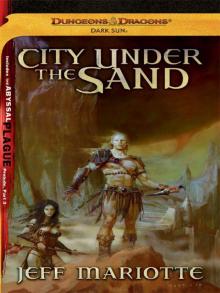 City Under the Sand
City Under the Sand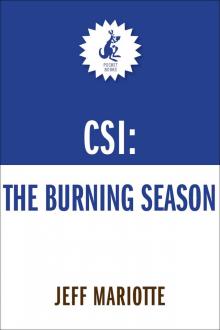 The Burning Season
The Burning Season Sanctuary
Sanctuary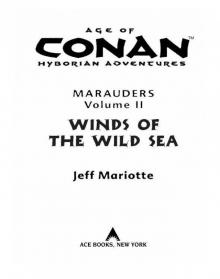 Winds of the Wild Sea
Winds of the Wild Sea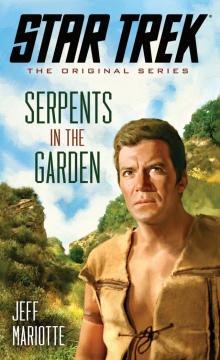 Serpents in the Garden
Serpents in the Garden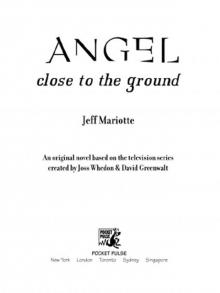 Close to the Ground
Close to the Ground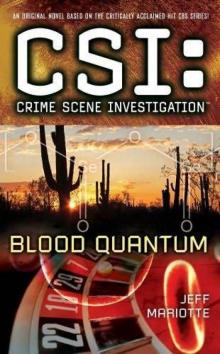 Blood Quantum
Blood Quantum Brass in Pocket
Brass in Pocket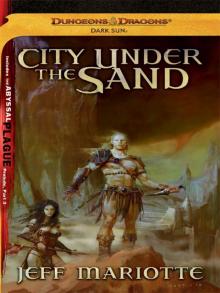 City Under the Sand: A Dark Sun Novel (Dungeons & Dragons: Dark Sun)
City Under the Sand: A Dark Sun Novel (Dungeons & Dragons: Dark Sun)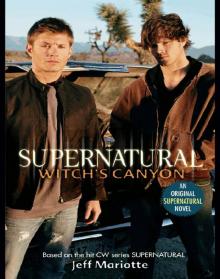 Witch's Canyon
Witch's Canyon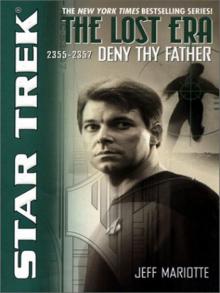 STAR TREK: The Lost Era - 2355-2357 - Deny Thy Father
STAR TREK: The Lost Era - 2355-2357 - Deny Thy Father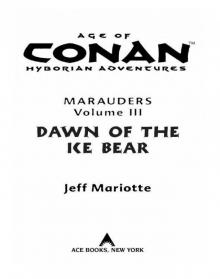 Dawn of the Ice Bear
Dawn of the Ice Bear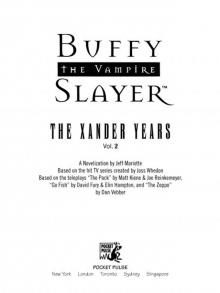 The Xander Years, Vol.2
The Xander Years, Vol.2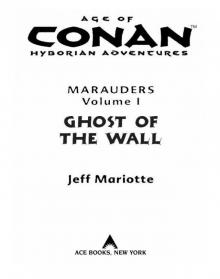 Ghost of the Wall
Ghost of the Wall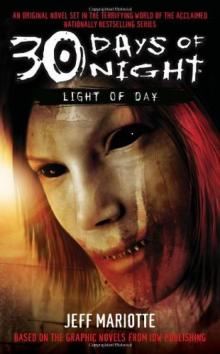 30 Days of Night: Light of Day
30 Days of Night: Light of Day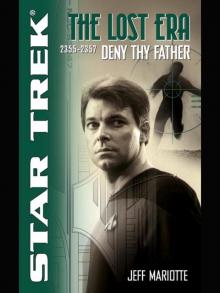 Deny Thy Father
Deny Thy Father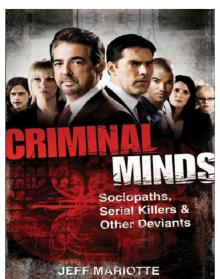 Criminal Minds
Criminal Minds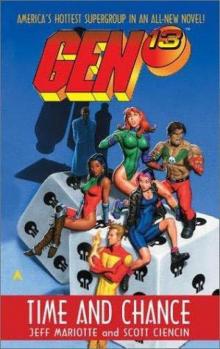 Time and Chance
Time and Chance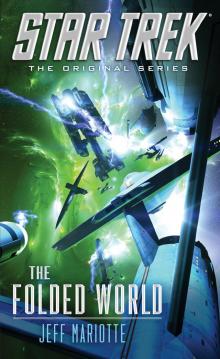 The Folded World
The Folded World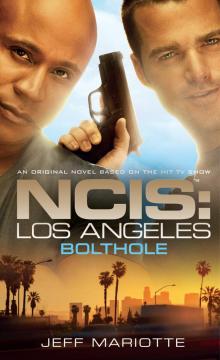 Bolthole
Bolthole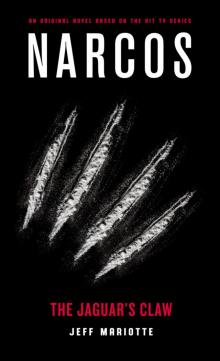 Narcos
Narcos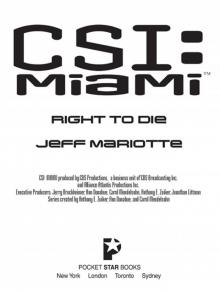 Right to Die
Right to Die